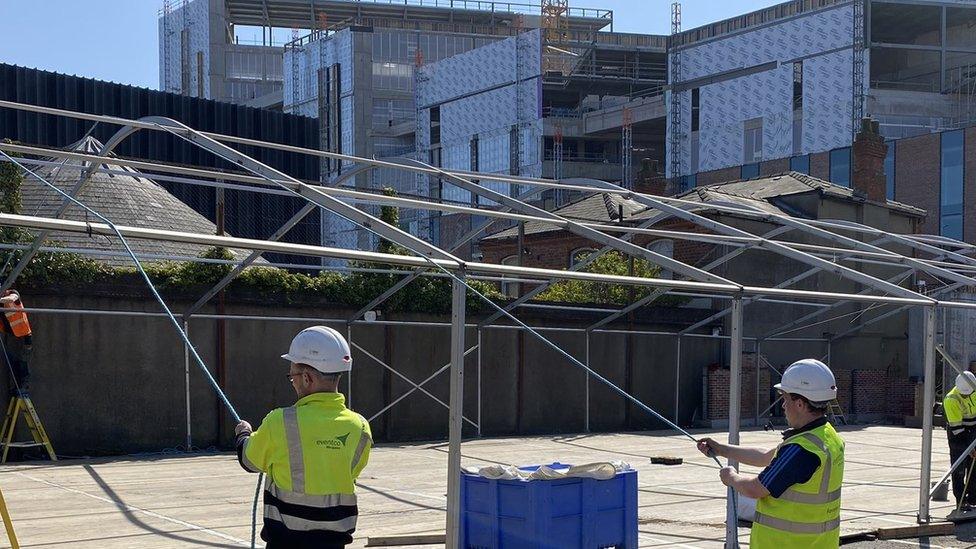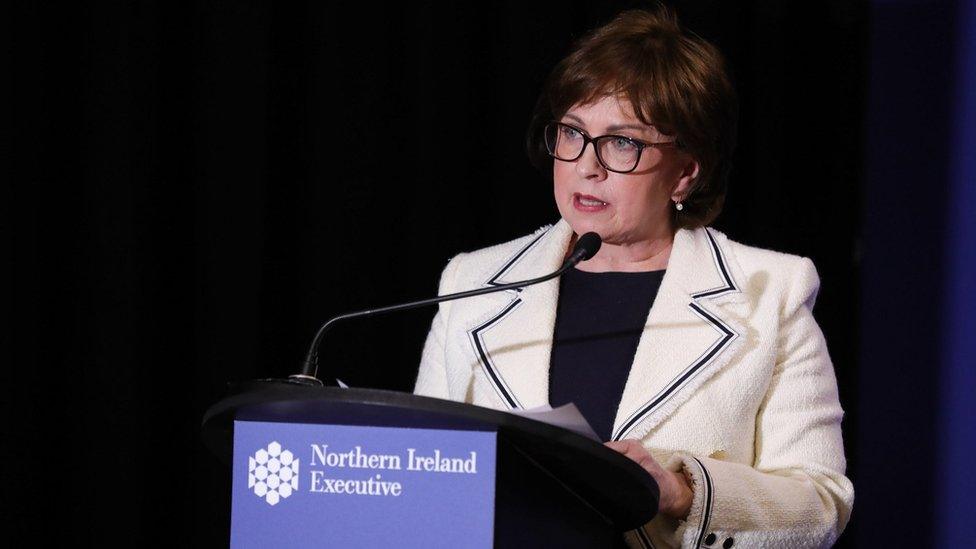Coronavirus: The businesses adapting to life in lockdown
- Published

Johnny McCamphill's marquee hire firm installed a large temporary structure at the Ulster University building site in Belfast
At the start of this crisis, one of the first business owners we spoke to was Johnny McCamphill.
He runs a marquee hire firm in north Antrim, a business which relies on people coming together for weddings and other events.
With social distancing about to become the norm his peak summer season was evaporating before his eyes.
Like many small businesses he has been scrambling to adapt over the past month.
This week he installed a large temporary structure at the Ulster University building site in Belfast.
It will accommodate bigger canteen facilities, allowing workers to socially distance and so get the site up and running.
'Sink or swim'
He says this work in the construction sector is now vital for him: "Like many other small businesses in my position it's sink or learn to swim.
"Or learn a different technique of swimming."
But for some businesses, particularly in retail and hospitality, all they can do is try to grab a life-raft in the form of government support.
The UK's government's job retention scheme is due to open to applications on Monday.
It is the scheme which will allow employers to temporarily lay off staff with the government paying those workers wages up to a maximum of £2,500 a month.
A Stormont scheme which will provide £25,000 grants for retail, hospitality and tourism is also due to open on Monday.

A SIMPLE GUIDE: How do I protect myself?
AVOIDING CONTACT: The rules on self-isolation and exercise
HOPE AND LOSS: Your coronavirus stories
LOOK-UP TOOL: Check cases in your area
VIDEO: The 20-second hand wash

It will compliment an existing scheme providing £10,000 grants to small businesses.
But around the executive table there is some tension about where to go next on business support, particularly on the issue of rates - the property taxes paid by businesses.
Stormont has given all businesses a three months rates holiday, equivalent to a 25% cut in their rates bill for the year.
In England businesses in the retail, hospitality and leisure sectors will not have to pay any business rates at all for the 2020/ 2021 tax year.
Scotland has a similar scheme but has also added airports and aviation handling businesses to the list.
For some multi-premise businesses this means a big difference in the levels of support available in the different parts of the UK.

Diane Dodds wants to introduce rates relief and grant support similar to England and Scotland
I'm aware of one local company that has worked out that the total rates relief and grant support they there are entitled to is just over £242,000.
But if they were in England or Scotland the support would amount to more than £1m.
Economy Minister Diane Dodds has made it clear she wants to introduce something similar to the English and Scottish schemes.
Cash flow
She has the backing of business groups, with the Northern Ireland Chamber saying: "The extension of rates relief so that Northern Ireland businesses benefit on a par with other UK regions would significantly improve cash flow and could save thousands of jobs here."
But Sinn Féin ministers remain to be convinced.
They are understood to want to more evidence about how best to target limited funds.
On Friday, Deputy First Minister Michelle O'Neill said there needed to be "a strategic conversation" around these issues.
Replicating the English scheme could cost about £200m, a very large chunk of the remaining support funds made available by the Treasury.
There will be more executive discussions on this next week and the Finance Minister Conor Murphy is also expected to urge ministers to have a greater focus on reallocating their existing departmental budgets rather than just looking to the new Coronavirus funds.
- Published17 April 2020

- Published15 April 2020
